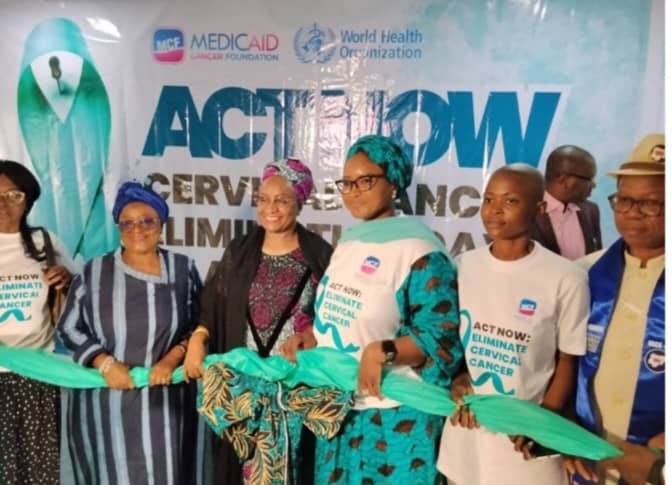
Dr. Rasheed Abassi is the Medical Director of Heritage Men’s Clinic, Ikeja, Lagos. In this interview with PAUL ADUNWOKE, he speaks on the misconceptions around reproductive health challenges among couples, what could be done to reverse the trend and why the current administration should prioritise healthcare delivery to Nigerians.
Where there is barrenness in the family, the woman is usually blamed when, in most cases, the man is should bear the bulk of the blame. How can this trend be reversed?
Scientifically, the data is clear. It is a case of an equal opportunity offender. In my clinical experience across West Africa, we have seen younger Nigerian men in their 20s with low sperm counts. Things like having difficulty having an erection in the morning is a tell-tale sign that it is time for you to get a check. The reproductive cycle is a subset of the cardiovascular system. In this part of the world, we are inundated with hypertension, diabetes and obesity.
Our diet plays a key role in all of these. It is not when you are trying to get your wife pregnant that you should eat ‘swallow’ at night. These are foods that divert blood away from the major parts of your body that need it. We should also be concerned about our prostate health. You cannot make adequate sperm cells if the prostate is not good. Therefore, I will encourage men above 40 years to always check their prostates at least twice a year.
Culturally, the proof of being a man is your libido. Faced with these challenges, some would not call for help for fear of being stigmatised. How do men know that it is normal to come out and seek help when having reproductive challenges?
In this space of men’s health, one of the things we face is stigma. There are some types of food that can affect your testosterone. Unlike women, when they get to a certain age, their estrogen goes to zero. For men, it is a gift from God, and should not get to zero. Men produce testosterone forever until death. Data tells us that if you eat certain types of foods that are estrogen-philic such as heavy swallows like eba and amala, all these add weight and disturb the production of testosterone. The reason it is a factor is because we cannot make good sperm cells. You can become impotent if your testosterone is low. If you wake up in the morning and there is no erection, that is a tell-tale sign. If your testosterone is good, you should wake up with a morning wood. It is time to see your doctor.
President Bola Ahmed Tinubu recently inaugurated his cabinet. What should be the focus of the Minister of Health?
We have a non-existent health delivery system so to speak. We have over 30,000 primary healthcare centres, with only 20 per cent being functional all over the nation. That is supposed to be one of the bedrocks of the government. The healthcare system is predicated on primary, secondary and tertiary healthcare. Unfortunately, the Federal Government is only focusing on the tertiary health institutions. They are looking at the teaching hospitals, but they need to do more to get to the grassroots level, which is the primary healthcare.
Our medical education is also non-existent. Nigerian doctors who established the healthcare system Saudi Arabia never came back. They established the Saudi Arabian healthcare system and created a vacuum here. We are not producing qualified doctors. Brain drain has heightened. Our medical schools do not produce good professors anymore. This is an opportunity for the new government turnaround the situation. And one of the things they can do is to start afresh and bring in private-sector players. We need investment-friendly initiatives, like good interest rates, for establishing health sector facilities.
For instance, my clinic is trying to expand; I have a 15-member clinic. The banks are ready to grant us some loans, but they are asking for a 27 per cent interest rate. That is not sustainable. If the Federal Government thinks healthcare is a priority, they need to show us in terms of budgetary allocation for health. I think they have started well because they chose a good administrator. But if the Federal Government can cap the interest rate for players in the health sector, it will help. The largest employer is the medical system, so we can employ more people. The taxpayers will foot the bill. I advocate for medical intelligence because, as at today, we do not know how many doctors we have, or how many doctors have relocated out of Nigeria in search of greener pastures. We do not have enough healthcare facilities for our people. If we invest in medical intelligence, it will be data-driven. Our preparedness for the next outbreak depends on the amount and quality of medical intelligence we have.
You have touched on some salient issues. Which of them do you think the government should prioritise to make an immediate impact in the health sector?
The accessibility and production of healthcare facilities. Nigeria exports $2.5 billion annually in medical tourism, and none of the dollars goes into primary healthcare. We need to make this environment greener for specialists. When you cap interest rates, you bring specialists and primary care doctors home. Nigeria will be able to compete in the free market system with investments in data. Data is the new gold, and medical intelligence will open up Nigeria’s healthcare sector. Are people even aware of Nigeria’s health insurance policy? It is non-existent. If we have medical intelligence, we will know who is privately insured, and how many needs to be on government insurance. We do not have the data, and that is why people are at the mercy of non-existent of Health Maintenance Organisation (HMOs).





